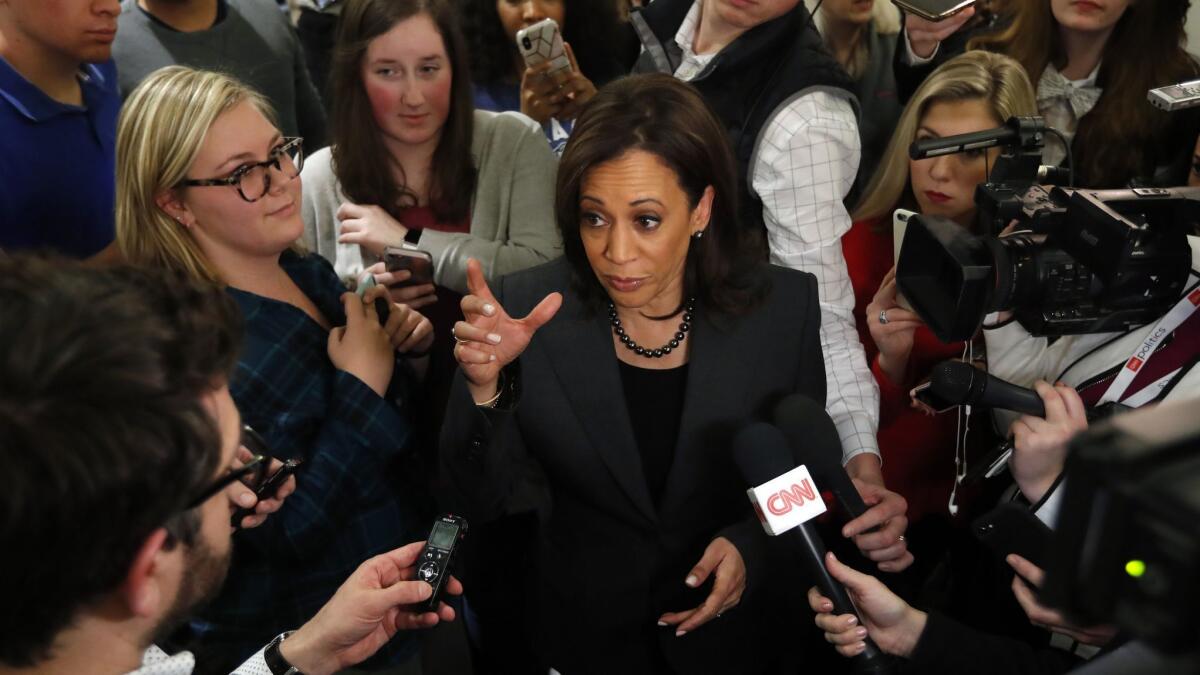Capitol Journal: Kamala Harris aces her first test with campaign rollout — with a few hiccups

Reporting from Sacramento — Sen. Kamala Harris vaulted into serious contention for the Democratic presidential nomination with a campaign kickoff that couldn’t have gone much better.
At least, she’s in serious contention for now. Sprinters who break from the gate fast sometimes stumble, trip and splatter all over the track. No one knows how Harris will fare when confronted by competitors.
One quality the former California attorney general and San Francisco district attorney did show in her campaign rollout is the grit to compete against stiff odds. She leaped into the race relatively early, seemingly without hesitation.
Another thing became evident: She’ll need to polish up her answers to some predictable questions from voters and journalists. If not, she’ll be hammered by campaign rivals and the media.
An example: In a televised CNN town hall at Drake University in Des Moines, Iowa, Monday night, Harris gave an out-of-sync answer about healthcare.
“We need to have Medicare for all,” she said. Then, to a follow-up question by moderator Jake Tapper, Harris indicated she’d eliminate private insurance.
“The idea is that everyone [will get] access to medical care and you don’t have to go through the process of going through an insurance company, having them give you approval, going through the paperwork, all of the delay,” she said. “Let’s eliminate all of that. Let’s move on.”
Well, it doesn’t work that way. Medicare is really a public-private partnership. Many Medicare beneficiaries buy supplemental private plans and the two function together.
Moreover, no healthcare plan — not even a single-payer program advocated by the Democratic left — could afford to operate without a bureaucracy that approves treatment, produces paperwork and causes some delay. Let’s be realistic.
Another example of a clumsy answer was when Tapper asked her why she opposed state legislation requiring the attorney general to investigate fatal shootings by police officers.
“I did not oppose the bill,” Harris replied. “I had a process when I was attorney general of not weighing in on bills and initiatives because … I had a responsibility for writing the title and summary. So I did not weigh in.”
Let’s just say there was a perception in the Capitol that Harris did oppose the police probe bill. And the inference that the attorney general writes titles and summaries of bills is just plain wrong. That’s handled by the Legislature’s own lawyer.
The attorney general does write titles and summaries for ballot initiatives. And that was Harris’ excuse for not taking positions on such controversial initiatives as two death penalty repeals, a measure to strengthen the death penalty, criminal sentencing reduction and marijuana legalization. It’s a lame dodge that no modern attorney general had used prior to Harris’ predecessor, Jerry Brown.
Coverage of California politics »
But overall, Harris’ week-long kickoff extravaganza was well planned and eye-poppingly impressive.
She announced her candidacy on ABC’s “Good Morning America” on Martin Luther King Jr. Day. Later, she campaigned in the early primary state of South Carolina to pitch for votes among African Americans, a focus of her campaign. Her father was Jamaican and her mother Indian.
The first big rally was a telegenic masterpiece, drawing 20,000 people on a sunny Sunday afternoon in downtown Oakland, her hometown. CNN carried her 35-minute speech live.
The Oakland site partially covered any blemish Harris might have had in voters’ eyes by being nurtured politically in ultraliberal San Francisco.
CNN promoted Harris for days. They did so by endlessly plugging their Iowa town hall. After the show, CNN announced it attracted the most viewers — an average of nearly 2 million — of any single-candidate town hall in the network’s history.
Harris performed well. She was personable and connected with the audience. She seemed passionate about her beliefs.
The timing was perfect. No Sunday football playoffs — just a meaningless, boring Pro Bowl game. No Monday night football. The government shutdown was over and, anyway, people were sick of hearing about it. Harris was something new.
Moreover, major newspapers and television networks had just mobilized their 2020 presidential coverage teams. They were eager for a test run. Harris got blanket coverage.
Early, emphatic campaign entries are a trademark of Harris’ campaign strategist, Ace Smith. They tend to discourage potential rivals from entering the race. Candidates also get early media attention, lock up campaign support and quickly begin raising money.
In the past, Harris announced early for the U.S. Senate. And another Smith client, Gov. Gavin Newsom, jumped early into last year’s gubernatorial race.
Capping off Harris’ successful rollout, Los Angeles Mayor Eric Garcetti announced Tuesday he won’t run for president. He denied being intimidated by Harris, but ...
Now Harris doesn’t have a pesky, major California rival.
“She got off to a good start by any measure or metric,” Democratic consultant Garry South says. But he adds that it’s still very early and no one is sure who her opponents will be.
“A spectacular kickoff, spectacular announcement, spectacular town hall,” says longtime Democratic strategist Robert Shrum, director of the Jesse M. Unruh Institute of Politics at USC. “She has obviously been catapulted to the top tier of candidates.”
“But that doesn’t mean she’s on her way to the nomination. You can have a great beginning and not so great an end.”
No California Democrat has ever come close to winning a presidential nomination.
But right now Harris seems to have the best chance of any Californian since Republican Ronald Reagan to be elected president.
Follow @LATimesSkelton on Twitter
More to Read
Get the L.A. Times Politics newsletter
Deeply reported insights into legislation, politics and policy from Sacramento, Washington and beyond. In your inbox three times per week.
You may occasionally receive promotional content from the Los Angeles Times.











